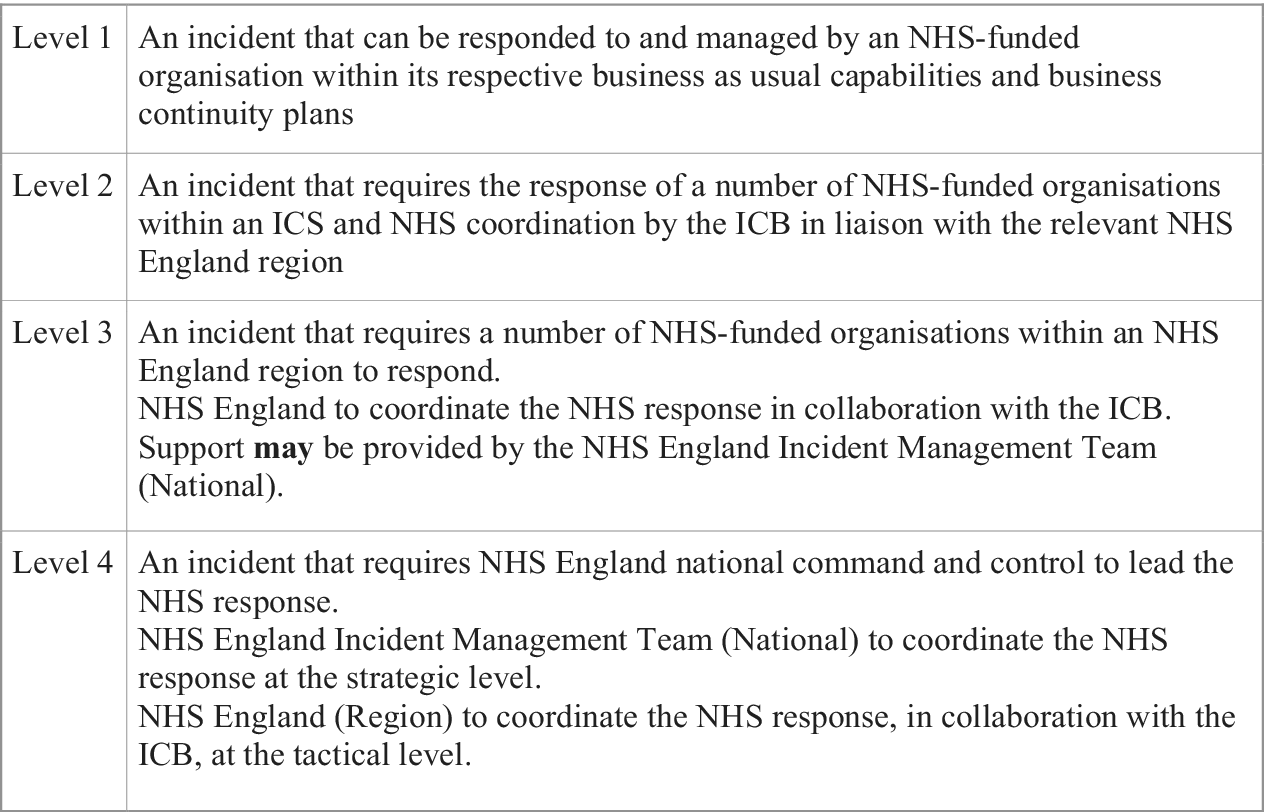In England, most organizations providing general hospital services are funded by the National Health Service (NHS). NHS England is the Commissioning Board for NHS services in England. Its Emergency Preparedness, Resilience, and Response (EPRR) Framework defines incidents and incident response levels for NHS-funded organisations. 1
Incidents are events that disrupt, or might disrupt, an organization’s normal service provision below acceptable levels and require special arrangements to be put in place. 1 (8-9) Incident response levels describe the extent of coordination required between NHS-funded organizations in order to respond to an incident or incidents. 1 (11) The NHS England EPRR Framework specifies 4 levels of response. These are shown in figure 1.

An Integrated Care Board (ICB) is a local organization within an Integrated Care System. The NHS England EPRR Framework states “each Integrated Care System (ICS) has an ICB bringing together the NHS locally to improve population health and establish shared strategic priorities within the NHS.” 1 (10)
The extent to which NHS-funded organizations in England operate at incident response levels above 1 is an indicator of the amount of coordination required between them in response to an incident or incidents. It is distinct from indicators of incident severity or operational pressures. The NHS England EPRR Framework requires these organizations to share lessons identified through incident response across the wider NHS. It states “[w]orking collaboratively will improve organizational cohesion and ensure patients and the public are safeguarded during an incident.” 1 (32)
Methods
Study Setting and Design
This was a review of the records of the number of days at incident response levels 2 and 3 of NHS-funded organizations in England which provide general hospital accommodation and services in relation to accidents or emergencies (described by NHS England as acute Trusts). Records from NHS England, the ICBs, and the Trusts themselves were reviewed.
During the review period there were 42 ICBs 2 and 122 Trusts. 3 The review size was determined by the number of ICBs and Trusts. The review timing was the 12-month period 1 year after the level 3 national incident for the NHS Coronavirus disease 2019 (COVID-19) response was stepped down in May 2023Reference Pritchard and Sloman 4 and 2 years after the national incident level for the NHS COVID-19 response was reduced from level 4 to level 3 in May 2022.Reference Pritchard and Sloman 5
The outcome of interest was the quantity of information regarding days at an incident response level held by organizations responsible for coordination at that level of incident response.
Approval for this review was not required by the Research Ethics Committee at University Hospitals Sussex NHS Foundation Trust.
Patient and Public Involvement
No patient nor public involvement.
Data Collection
A request was made under the Freedom of Information Act via the WhatDoTheyKnow website to NHS England for any record held of the number of days the Trusts were at level 2 and 3 incident response levels in the review period. 6 Requests were made by the same method to the ICBs for any record held of the number of days the Trusts in their localities were at level 2 and 3 incident response levels in the review period. 7 Requests were made by the same method to the Trusts for any record held of the number of days they were at level 2 and 3 incident response levels in the review period. 8
Results
NHS England had a record of the number of days Trusts were at level 3 incident response for 3 of its 7 regions, representing 19 ICBs and 43 Trusts. Of the 23 ICBs and 79 Trusts for which NHS England did not have such a record, the ICBs or the Trusts had records of 16 Trusts being at level 3 incident response for at least 1 day.
24 ICBs had records of the number of days Trusts in their localities were at level 2 incident response, representing 56 Trusts. Of the 18 ICBs that did not have such records, representing 66 Trusts, 14 Trusts had a record of being at level 2 incident response for at least 1 day.
Limitations
It was not possible to explore the reasons why NHS England and some ICBs did not hold information about incident responses for whose coordination they were responsible. The NHS England EPRR Framework’s requirement that NHS England and ICBs share lessons identified through incident response across the wider NHS 1 is a reason why they should hold such information.
Discussion
NHS England is responsible for coordinating regional incident responses. 13% of NHS acute Trusts had records of regional incident responses but NHS England did not have records of these responses. ICBs are responsible for coordinating local incident responses. 11% of NHS acute Trusts had records of local incident responses but their ICBs did not have records of these responses.
Conclusion
The extent to which NHS acute Trusts operate at incident response levels above 1 is an indicator of the amount of coordination required between them for incident response. If this indicator was measured and recorded completely then it could inform the levels of awareness NHS England and ICBs have of the need for coordination of hospitals in response to incidents. NHS England and the ICBs might benefit from reviewing how they measure and record this indicator. This review may also be of interest to other bodies at local, regional, and state level which coordinate hospitals in response to incidents.
Author contribution
William Wetherell is the sole contributor to this manuscript.
Funding statement
This research received no specific grant from any funding agency in the public, commercial, or not-for-profit sectors.
Competing interests
The author is a bank employee of University Hospitals Sussex NHS Foundation Trust and has no other conflicting interests.
Ethical standard
This review is a quality improvement project and so approval was not required by the Research Ethics Committee at University Hospitals Sussex NHS Foundation Trust.
Declaration of patient and public involvement
No patient nor public involvement.


